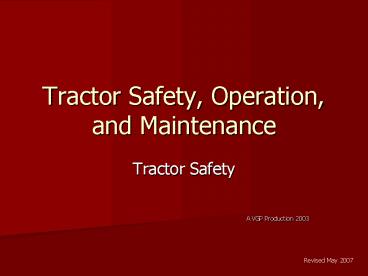Tractor Safety, Operation, and Maintenance - PowerPoint PPT Presentation
1 / 21
Title:
Tractor Safety, Operation, and Maintenance
Description:
Never refuel while the engine is running or hot. ... Never attach a post or log to the rear wheels when the tractor is stuck in the mud. ... – PowerPoint PPT presentation
Number of Views:295
Avg rating:5.0/5.0
Title: Tractor Safety, Operation, and Maintenance
1
Tractor Safety, Operation, and Maintenance
- Tractor Safety
- A VGP Production 2003
Revised May 2007
2
Importance of Safety
- Annually, 300 to 400 tractor-related deaths occur
on U.S. farms. Over 50 percent of tractor-related
deaths are caused by tractor roll-overs. A roll
bar or roll-over protective structure and seat
belt usage could have prevented all of these
deaths. Other fatalities include falls,
run-overs, crushes and PTO entanglement.
3
Types of Tractor Injury-Incidents
- There are several types of tractor mishaps that
result in injury. Common mishaps are - by-pass starting
- front-end loader incidents
- rearward tractor rollovers
- sideways tractor rollovers
- falls from tractors
- tractor runovers
- caught-between crushing
- PTO stub shaft entanglements
4
Tractor Accidents Are Costly
5
Tractor Operator Responsibilities
- There are eight primary responsibilities the
safe tractor operator must meet whenever the
tractor is used. They are - conducts proper maintenance
- conducts pre-operation checks
- avoids injury-incident situations
- maintains safety features
- uses tractor as intended
- refuels safely
- starts and stops safely
- adjusts the tractor for safety
6
Safe Operation
- Read and understand the Operator's Manual(s)
before operating the equipment. - Keep your equipment in good condition.
- Never start an engine in a closed shed or garage.
- Always keep your PTO properly shielded.
7
Safe Operation
- The Rules of Tractor Safety
- Use ROPS and seat belt whenever and wherever
applicable. - Do not wear the seat belt when the ROPS is
folded.
8
Safe Operation
- Use special caution on slopes, slow down for all
turns and stay off the highway whenever possible. - Keep your hitches low and always on the drawbar.
Otherwise, your tractor might flip over
backwards. - Keep wheels spread wide whenever possible
9
- Learn and use hand signals.
- Do not add coolant to the
- radiator while the engine is hot
- hot coolant can erupt and
- scald.
10
Safe Operation
- Never refuel while the engine is running or hot.
- Always fuel your tractor outside and store your
fuel outside. - Check the Work Area. Know in advance where hidden
ditches, large rocks, stumps or any other debris
is located.
11
Safe Operation
- Never Pop the clutch or practice unsafe
maneuvers. - Never hitch to the axle or other high point.
- Never attach a post or log to the rear wheels
when the tractor is stuck in the mud. - Disengage the power take-off when it's not in
use.
12
Safe Operation
- Never get off a moving tractor or leave it with
its engine running. - Keep all children off and away from your tractor
and its implements at all times.
13
Safe Operation
- Outfit your equipment with a first aid kit, a
small tool kit for minor repairs, and a fire
extinguisher. - Make it a firm, unbreakable, no-exceptions rule
NO RIDERS! - Keep safety labels clean and free from
obstructing material.
14
Safe Operation
- Dress Properly .Well-fitted, belted clothing is a
must. - Don't jump off the tractor
- Use the steps and handholds, face towards the
tractor, and watch your step. - Steps should be cleaned regularly and kept free
of dirt, grease and oil.
15
Safe Operation
- When you shut down your tractor
- - Put the PTO lever in neutral
- and lower attachments to
- the ground.
- - Always shut off engine, set
- the park brake(s) and
- remove key.
- - Whenever possible, park
- on level ground.
16
Transport Safety
- Use an SMV (Slow Moving Vehicle) sign, proper
clearance flags, lights and warning signals - Be sure the brake pedals are locked together and
properly adjusted to assure straight-line stops. - Prepare Your Attachments. Make sure they are
secure, properly mounted. Carry them in the
transport position.
17
Transport Safety
- Slow down, pull over and let the normal traffic
pass you. - Control Your Speed. A tractor is designed for
easy maneuverability at low speeds, not high
speeds. - Slow Down on Turns or Curves.
- Have the tractor in the same gear going downhill
as you would to go up, in order to use engine
compression for braking.
18
Transport Safety
- Never, ever, coast downhill. It will allow the
tractor speed to exceed that for which it was
designed. - Know Your Stopping Distance. Always leave enough
room to stop. - Never use the differential lock while in
transport. The tractor will tend to continue in a
straight line when you are attempting to turn.
19
Tractor Training Program
- Fair Labor Standards Act of 1938
- (FLSA) as amended Covers
- employment in Hazardous Agriculture
- Occupations
20
Tractor Training Program
- Age 16 minimum for hazardous employment operating
a tractor over 20 PTO horsepower, or connecting
or disconnecting an implement or any of its parts
to and from a tractor. - Age 16 minimum for operating other listed
hazardous farm equipment - Minors 14 or 15 years old who hold certificates
of completion of either the tractor operation or
machine operation training program offered by
Vocational Agriculture Teachers or Extension
Service may work in the occupations for which
they have been trained.
21
THE END































